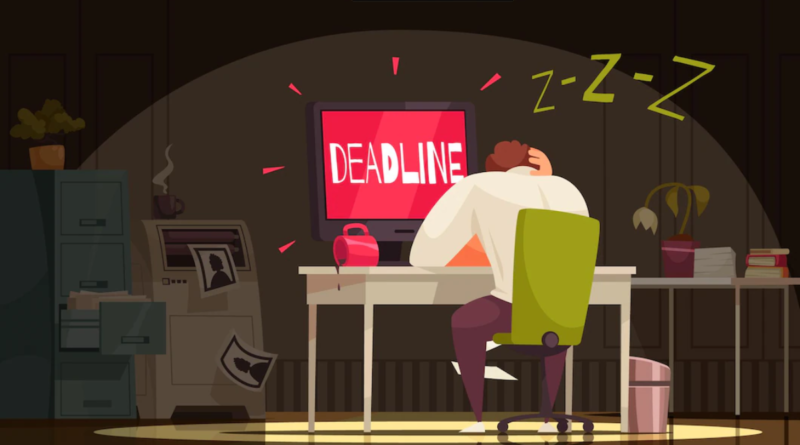Business & Finance
Employee Burnout: 10 Ways to Prevent It

Your employees are the key to your business’s success, but that doesn’t mean they won’t get burned out every now and then. Everyone gets tired from time to time, but if your staff members are experiencing burnout symptoms like apathy, low productivity, and an aversion to company events or activities, it’s time to take action in order to prevent employee burnout.
What is Employee Burnout?
Employee burnout is the cumulative exhaustion from prolonged periods of stress and overworking. Symptoms of burnout include excessive work hours, lack of satisfaction at work, a sense that one’s work has no meaning or value, and a general detachment from what one does. If left untreated, it can lead to an increased risk for poor mental health and even physical ailments such as heart disease.
Employee burnout can be detrimental to workplace culture, but it is a very real—and increasingly common—phenomenon. In fact, research shows that 70% of workers today are experiencing stress-related illnesses because of overextending themselves at work. Furthermore, one in six workers experiences burnout at some point in their lives. Fortunately, there are several things you can do to prevent employee burnout from negatively affecting your team members.
In fact, if you’re concerned that your employees are showing signs of burnout, it may be useful to evaluate how you and your organization could be contributing factors. Identifying potential causes allows you to develop solutions and prevent these issues from occurring in the future. For instance, some organizations may need better time management skills for their teams. Others may have overly demanding expectations for staff. Still, others might have no clearly defined project structure or goals, leaving employees feeling overwhelmed and disengaged from work.
What Are The Typical Signs Of Employee Burnout?
Each case of burnout is unique, but there are a few common symptoms to be on the lookout for.
There are several signs, for example
- Reduced stamina and joie de vivre
- Becoming displeased with your job
- Lower levels of productivity than usual
- Being bad at maintaining focus on a single task for an extended amount of time
- The symptoms of an irritable individual
The focus should not be on what’s happening so much as it should be on your coworker’s behavior. If he or she seems to have a drastic shift in normal behavior, then use that opportunity to speak to them to make sure they are okay. If you’ve got problems on your mind, it’s much better to write them out than keep them in your head. As the saying goes, the weight shared is the weight halved.
Here are 10 ways to prevent employee burnout.
1) Put An End To Multitasking
Multitasking may seem like the best way to get a lot done quickly, but it actually decreases productivity and increases stress. After all, our brains weren’t designed for multitasking. Instead, focus on one thing at a time and you’ll feel more accomplished and less burned out.

Don’t check your email or messages until you’re done with your work for the day. You’ll be less stressed, and you’ll get more done. Plus, you might find that a relaxing break helps motivate you to come back to work with renewed focus.
2) Create reasonable workloads
If your staff is feeling overwhelmed or burned out, it can be a sign that they’re not being challenged enough or there’s too much work for them to do. One way to prevent this is by creating reasonable workloads for each employee based on their skills and ability. This way, everyone will get the same amount of work and have time left over for themselves and their families. Another way is by using collaborative leadership styles in order to reduce burnout from remote work.
Create a positive work environment. The next step is finding ways to make your remote workers feel more connected and productive with their work so they don’t get burned out. A good way to do that is by creating a positive working environment where remote employees are encouraged to give input, have regular meetings with management, and are rewarded for meeting goals. This will help them feel like they’re valued members of your team who know what’s going on within your organization.
3) Get Enough Sleep
Getting enough sleep is one of the most important things you can do for yourself. Not only will it prevent burnout, but it will also boost your productivity and make you more focused. Be sure to take care of your sleep schedule by eating a healthy dinner before 7 pm and going to bed by 11 pm.

When you’re ready to schedule your day, be sure to make time for breaks, and don’t take on more than you can handle. Take a small break every 90 minutes or so by stepping outside, going for a walk, calling a friend—anything that helps you decompress and avoid burnout.
4) Invest in Yourself
As a business owner, your employees are the backbone of your company. They are the ones that keep it running smoothly and they’re the ones who will influence employee retention. To avoid burnout of any employees, you can do some things such as understanding how it’s happening, having a formal program in place to prevent burnout, investing in yourself, and being aware that everyone is different.
You want to make sure you’re investing in yourself, too. This is crucial because if you don’t take care of yourself, you might get burned out first and that will certainly cause employees to burn out as well. You can help avoid burnout by being aware of your needs as a person and what kind of support systems you have in place for them. If need be, adjust your self-care system so that it aligns with your work demands.
5) Know When to Ask for Help
If you or your employees are victims of burnout, it is time to rethink your strategy. In some cases, it can be as simple as taking a break from work and returning refreshed. Other times, though, you may need the help of a professional coach who can help you pinpoint the cause of your burnout and then help you find ways to alleviate it.

Once you have your plan, you may find that it doesn’t work as well as you’d hoped. In cases like these, consider making some minor changes. If that doesn’t do the trick, though, try again with a new approach until you can get results.
6) Build Relationships at Work
It’s important to maintain good relationships with your coworkers, as they can be a source of support during times of stress. In a recent study by Gallup, employees who engaged in social activities outside the office reported feeling more energized and less stressed. This is because it provides an opportunity for them to recharge and feel like part of a team.
Employees should also look for ways to spend time with their colleagues outside of work. This way, even when they’re not interacting during company time, they’ll continue to build their relationships and maintain a healthy social life. This will keep them from developing feelings of isolation at work, which can be a major source of stress.
7) Create Physical Boundaries
It’s important for employers and employees alike to have some physical boundaries between them. Think about it this way – your employer is in control of your paycheck, and that paycheck is what allows you to pay your bills. If they don’t feel like they can trust you, they’re not going to give you a paycheck.

If an employee is acting in a way that makes you feel uncomfortable, then it’s time to create some boundaries. Sit down with them, and ask them what they expect from you. Are they not following up because they know it’s not going to result in anything anyway? Are they asking too much of you? Whatever the reason may be, explain your needs and help them understand where you’re coming from. If something continues after that meeting, take action – such as firing or demoting them if necessary.
8) Set Realistic Goals
Setting realistic goals is a key component in preventing employee burnout. Employees thrive when they feel challenged, but also feel like they are making progress and are able to set themselves up for success with achievable expectations. Goals should be specific, measurable, attainable, relevant, and timely (S.M.A.R.T.).
You can also set goals for your company as a whole, with your teams in mind. This allows you to focus on larger, more ambitious, and often difficult goals by breaking them down into smaller chunks that employees can focus on completing individually. If a team achieves its portion of a goal, it should feel like it contributed and are a part of something bigger.
9) Listen Closely to Your Body
Take care of your physical needs first by getting enough sleep, eating well, and exercising. Then, learn the signs of burnout and try to adjust your work environment accordingly. If these strategies don’t work or your employer doesn’t want to change anything about the way you work, take a break from the company for a little while.

Avoid taking on too much responsibility in addition to your regular work duties. For example, don’t take projects home with you and use company time for personal activities like taking long phone calls with friends or family members. Keep an eye out for any changes in behavior that could be a sign of burnout, such as having a hard time making decisions and becoming easily distracted.
10) Remember that Stress Can be Good
Stress can be a great motivator. The way your brain and body react to stress can even help you work faster, stronger, and smarter. But when stress becomes overwhelming or constant, it can lead to health problems like high blood pressure and depression. That’s why it’s important for employers and employees alike to find ways to identify the signs of burnout before they get too serious.
We know stress can make you feel overwhelmed, frustrated, and even hopeless. But remember that burnout is preventable and reversible. Here are some strategies for turning things around before burnout takes hold in your life or at work.
Final thoughts
There are a lot of things that can cause burnout. The best thing you can do is keep track of how you’re feeling, and if you’re feeling overwhelmed, take a break. The more proactive you are in fighting the symptoms and causes of burnout, the longer your work life will be.
